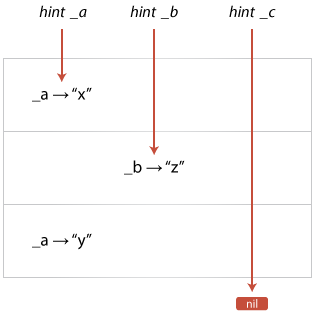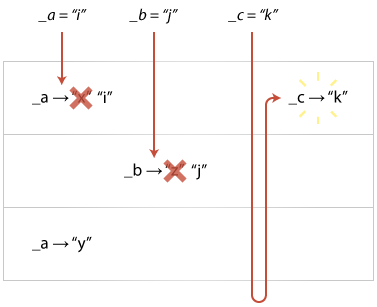Private Variables in ARMA 3 SQF
ianbanks |
Private variables and scopes are pretty simple in ARMA 3 scripting. The
problem is—as it often is—that the documentation isn't very clear.
Confounding matters further, SQF uses dynamic scoping—rather than the more
common and easier to understand conventions of static scoping. A block is any piece of code surrounded by braces, or compiled using the
compile function. You can think of braces as a shortcut for compiling
a string of code. For example, these two snippets of code are practically
identical: The result of both the braced code block and the compile call is to
create a CODE object—the only difference between them is when
exactly the code is compiled. A CODE object—like other objects
such as players, vehicles and strings—may be assigned to variables,
passed to functions, and placed into arrays. The code inside a block isn't executed when the block is created. To make
the code run, the CODE object created by the block needs to be
called, either by using the call or spawn operators, or by
using it in control statements such as if or forEach: When a CODE object begins to run—because you called it or used
it in a control statement—the SQF engine creates a scope. When it
finishes running—either by getting to the end or by exiting early with
exitWith or one of the break commands—the engine automatically
destroys the scope. A scope is created every time a block is called, even if it is the same
block being called multiple times. This is what makes private
variables—which are stored in scopes—private. For example, if you spawn a CODE object that uses a private
variable, twice: The engine creates two independent scopes, which each contain
different instances of a variable called _a. Scopes can be stacked on top of each other. When a scope is created, the
engine usually stacks it on top of the current scope, which is the
scope that called the CODE object: As the above example is executed, the scopes look like this: Stacking of scopes is how the engine lets private variables wander out
into other scopes. Consider this code: If scopes didn't stack, the { _value = 0; } code
block would not have access to update the private variable created
in the outer scope. When a scope is destroyed—because the code finished running—it
is also taken off the stack of scopes. Scopes are created and stacked based on these rules: When you read a private variable—as in hint _someVariable: The stack of scopes is searched from the current (topmost) scope
downwards until the private variable is found. If it is not found, the
expression result is nil. When you update a private variable—as
in _someVariable = "hello": The stack of scopes is searched from the current (topmost) scope downwards
until the private variable is found. If it is found, it is updated in the
same scope it was found in. If it is not found, one is created in the
current (topmost) scope. Two things can go wrong with this rule. The first is that the current
scope is often not the scope you want your private variable in: The second thing that can go wrong is that you don't always know if a
private variable is already defined in a lower scope. If it is, the
assignment will update it when it probably shouldn't have: To deal with both issues, the following rules exist: Commands like params and forEach work by assigning values
to private variables in a specific scope. The private command
also does this; but it assigns the special nil value to the variable.
You can see this happening with this example: What happens when a private variable exists in more than one scope? The rules stated above for reading and updating private variables explain
this case; the topmost scope that contains the private will be read from or
updated, and the lower scopes containing the same private are ignored; until,
that is, the upper scope is destroyed. At that point the lower private
variable becomes visible again: Assigning nil to a private variable doesn't actually undefine the
variable. nil is a value, just like 1 is a value, and
the rules for assigning it—to private variable at least—are
exactly the same. You can see this with the following example: If _a = nil removed the private variable from the scope, you would
expect the subsequent _a = 3 to be applied to the outer scope. It
isn't—though—and _a continues to be a private variable
within the inner scope. However, global variables are handled differently. If you assign
nil to a global variable, it is considered a special case
and the variable name is removed from the symbol table of the namespace
(which can be verified by making a call to allVariables on
the namespace). One of the consequences of the rules for private variables is that any function
you call can read—and change—every private variable from the bottommost scope of
the first .sqf file executed (with execVM or spawn) all the way up
through the call stack to itself. Take this script for example:
This is true even for compiled functions, like bis_fnc_diagLoop; if the function
reads or writes a private variable without using private first, there is
a risk it will overwrite the variable in some unrelated scope. The only time you might be able to avoid using private is when:
In other words, never. One of the key things to remember about SQF scoping is that
a CODE object has no idea where it was originally created. At first glance,
the following looks like the inner function would have the private
variable _a defined: In SQF—however—it doesn't. The scope that _a
is created in is destroyed once the if block finishes, and
the CODE object assigned to the global inner has no idea
that it was created in that scope. Instead, the only private variables
available to a called CODE object come from the scopes of the
code that called it. This is called dynamic scoping. This isn't the case in other languages. In many other languages, the
equivalent to CODE objects also include references to
local variables that are physically (lexically) close to where they
were created—rather than where they are used. This is called lexical
scoping, and is often preferred because it makes more sense to humans. A common trick (or "idiom") in ARMA 3 scripting is special private
variables, where the engine calls your code with some variables
already defined. For example, forEach does it with _x, and
onMapSingleClick does it with _pos. There are quite a few
in ARMA 3, and for more you can refer to Killzone Kid's comprehensive list of all of them. The same thing is possible from user code, due entirely because of the
rules of SQF's dynamic typing. For example, if you were writing a framework
that allowed the user to hook framework generated events, you could
call the user function with your own special variables: The user code would then expect these private variables to already
exist when it is called:Blocks
if (_naughty) then { player setDamage 1 };
if (_naughty) then (compile "player setDamage 1");
_someCode = { player setDamage 1; };
// The player is always still alive here.
if (1 < 2) then _someCode;
// Now, not so much.
Scopes
_someCode = { private "_a"; _a = random 10; };
[] spawn _someCode;
[] spawn _someCode;
_naughty = true;
 _someCode = {
private "_d";
_d = random 1;
player setDamage _d;
_someCode = {
private "_d";
_d = random 1;
player setDamage _d;
 };
};
 if (_naughty) then
{
// The if resulted in a scope being created for this
// code block; when _someCode is called the engine will
// create another scope and stack it on top of this one:
if (_naughty) then
{
// The if resulted in a scope being created for this
// code block; when _someCode is called the engine will
// create another scope and stack it on top of this one:
 call _someCode;
};
call _someCode;
};

private "_value"; _value = random 1;
if (_value < 0.5) then { _value = 0; }
The Rules


if (_someCondition) then
{
_myLocal = 1;
}
else
{
_myLocal = 2;
};
hint str _myLocal; // error; "_myLocal" is not defined.
badFunction =
{
// oops, forgot to use private:
_x = getPos player select 0;
_y = getPos player select 1;
_x + _y
};
{
call badFunction;
hint str _x; // prints the "x" coordinate of the player; eek!
}
forEach [1, 2, 3, 4];

private "_a";
_a = 1;
hint str isNil "_a"; // hints "false"
if (true) then
{
private "_a";
hint str isNil "_a"; // hints "true"
}
private "_a";
_a = 1;
if (true) then
{
private "_a";
_a = 2;
}
hint str _a; // hints "1"
Assigning nil
private "_a";
_a = 1;
if (true) then
{
private "_a";
_a = 2;
_a = nil;
_a = 3;
};
hint str _a; // hints "1"
Always, Without Exception, Use Private
test = { hint str [_a, _b]; };
private "_a";
_a = 1;
call test; // hints [1, any]
private "_b";
_b = 2;
call test; // hints [1, 2]
Lexical Scoping and Dynamic Scoping
if (true)
{
private "_a";
_a = 1;
inner =
{
hint str _a;
};
};
call inner;
A Silver Lining
fwk_fnc_addEventHandler =
{
fwk_eventHandlers pushBack _this;
};
fwk_fnc_invokeNukeDetonationEvent =
{
[] spawn
{
private ["_event", "_radius"];
_event = "nukeDetonation";
_radius = 5000;
{
call _x;
}
forEach fwk_eventHandlers;
}
};
{ hint str [_event, _radius]; } call fwk_fnc_addEventHandler;